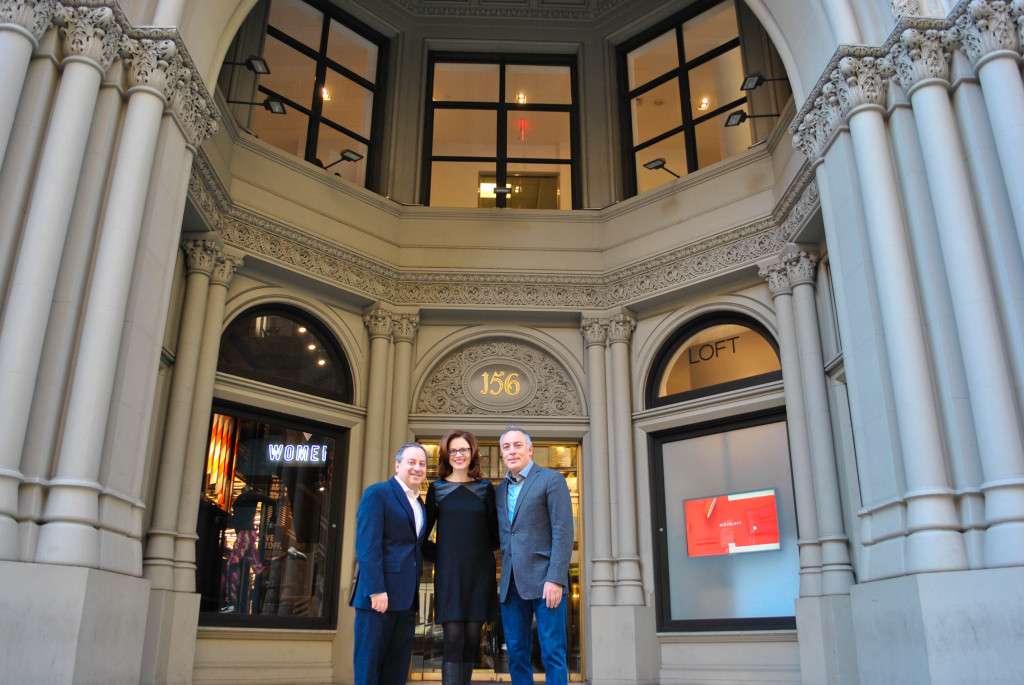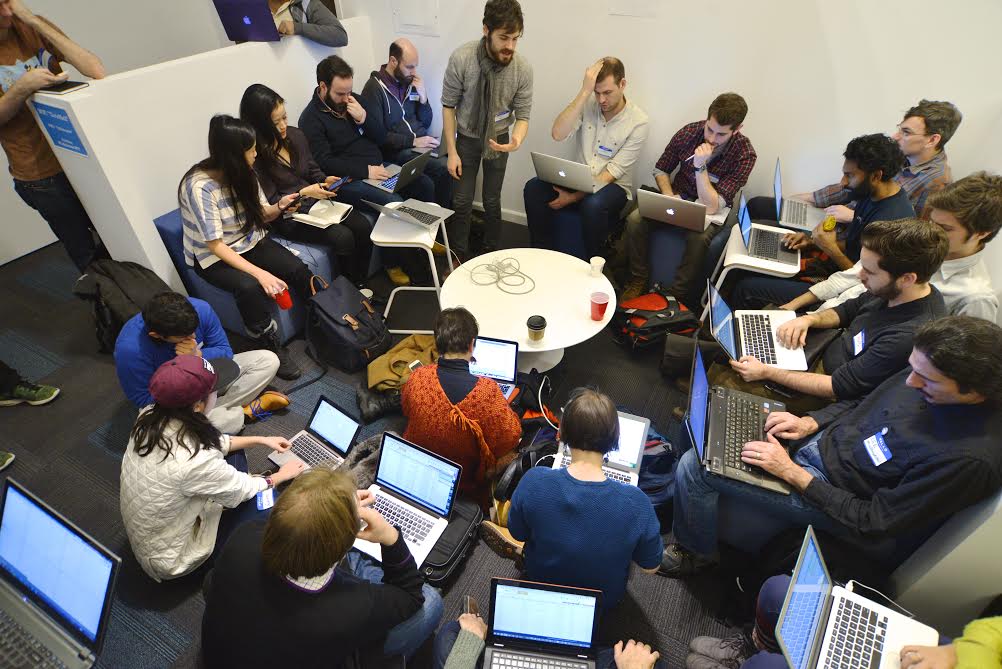The lasting gifts from technologists to the world will be simplicity and functionality.
That seems to be the message that Micah Sifry, an early open government advocate, is sending with his cofounding of Civic Hall, a coworking space in Manhattan’s Flatiron District focused on civic innovation. It spun out of the community that attended and grew his popular Personal Democracy Forum.
“We had a few thousand attendees and an even larger network. The forum is where they can find their next collaborator,” Sifry said. “Civic Hall answered for us, ‘What can you do year-round that would extend that proposition?'”

Civic Hall Executive Director Micah Sifry, COO Heidi Sieck and cofounder Andrew Rasiej. (Courtesy photo)
From the design thinking that started with creative agencies to the growing popularity of rapid prototyping, tech culture is widening. Sifry, with cofounders Andrew Rasiej and Heidi Sieck, is looking to build a place for that approach to come to the civic realm — offering a more specific focus than global coworking network Impact Hub or Washington’s OpenGovHub, where, full disclosure, Technical.ly DC is a paying tenant.
So, how best to define the realm of civic tech?
To hear Sifry describe it, civic has two core definitions: “How government transforms the way it co-creates and all the ways people organize their own power,” he said.
Civic Hall’s vetting of potential members sounds something like this: “What’s your connection to the civic tech ecosystem? How are you trying to use civic tech for good?”
Though there are lower levels, the two primary membership tiers are $300 a month to work from the space 10 days a month and $550 for complete access.
On one day in January when we visited, we found a cofounder of Fight for the Future and board members of the Internet Society. In the kitchen, there were wonky discussions of how libraries could become Internet Service Providers.
Sifry hopes the space becomes multi-disciplinary, including representatives from local and federal government, activists and conventional advocacy groups, hackers, creatives and writers.

Attendees of the Code Across New York hackathon. (Courtesy photo)
Last month, the space hosted the Code Across New York hackathon.
“This is no one’s home territory. It’s a third place,” Sifry said. “Government can leave their confines and meet with advocates.”
To accomplish this, the toolset consists of familiar coworking staples: “people, events and collaboration,” said Sifry.
The space is circular, with a large, flexible events space connected to an open coworking floor by two short hallways of offices and breakout rooms. The kitchen is the hole of the donut. The glassy space is modern with lots of natural light, particularly in the coworking space, with its ample windows.
Nearby, Sifry shared his mission.
“We are still dealing with government built for a industrial age and it runs in an in industrial way. We don’t have a personalized government,” he said. Then he quoted citizen advocate Tom Steinberg: “You can give a recipe to a dog, but it won’t know how to cook a meal.”
If after years of people like Sifry and Steinberg organizing and lobbying for more innovative government, there is still so much more work to be done, are we getting there? Open data is more familiar to civil servants, sure, and bureaucrats often talk about responsiveness.
“There is an awakening underway,” he said. “Some of this government should do. Some will go into the background, and we’ll take it for granted like we do for street signs.”
But other features will get taken up by citizens and mission groups, he added — look at SeeClickFix as an example of a company filling a key role.
In all, the goal is to move forward the simplicity and functionality of sleek technologies into the wider world.
“Let’s make apps more civic, not more civic apps,” he said. “The civic tech community is a movement of opportunity. If it doesn’t manage to develop tools and products and projects that meaningfully improve people’s lives, it will just be another fad.”
Before you go...
Please consider supporting Technical.ly to keep our independent journalism strong. Unlike most business-focused media outlets, we don’t have a paywall. Instead, we count on your personal and organizational support.
3 ways to support our work:- Contribute to the Journalism Fund. Charitable giving ensures our information remains free and accessible for residents to discover workforce programs and entrepreneurship pathways. This includes philanthropic grants and individual tax-deductible donations from readers like you.
- Use our Preferred Partners. Our directory of vetted providers offers high-quality recommendations for services our readers need, and each referral supports our journalism.
- Use our services. If you need entrepreneurs and tech leaders to buy your services, are seeking technologists to hire or want more professionals to know about your ecosystem, Technical.ly has the biggest and most engaged audience in the mid-Atlantic. We help companies tell their stories and answer big questions to meet and serve our community.
Join our growing Slack community
Join 5,000 tech professionals and entrepreneurs in our community Slack today!

The person charged in the UnitedHealthcare CEO shooting had a ton of tech connections

Delaware students take a field trip to China using their tablets and ChatGPT

From rejection to innovation: How I built a tool to beat AI hiring algorithms at their own game



